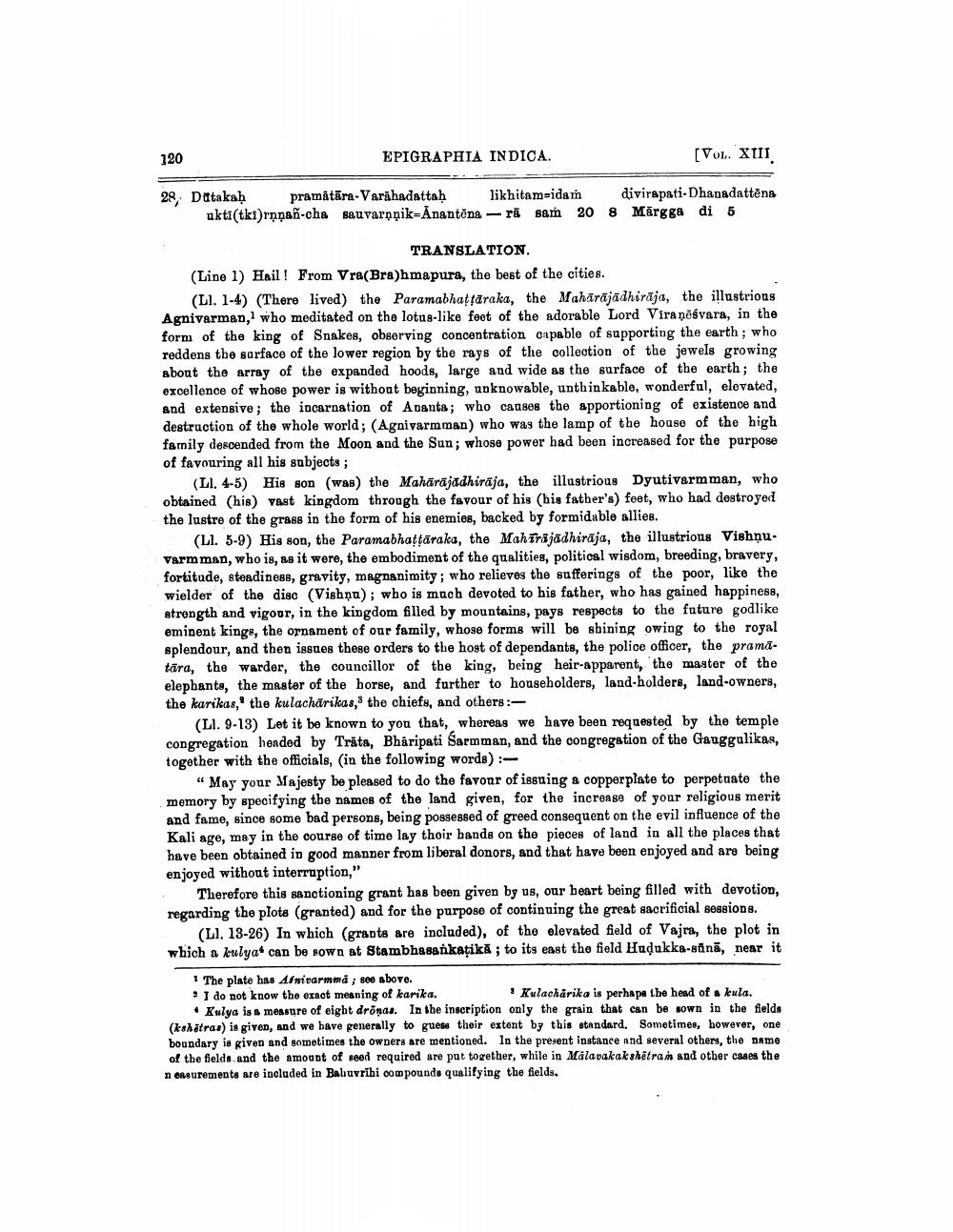________________
120
EPIGRAPHIA INDICA.
[VOL. XIII
28, Datakaḥ pramátāra-Varahadattah likhitam-idam divirapati-Dhanadattēna
akti(tki)rņņañ-cha sauvarnņik-Anantēna - rā sam 20 8 Mārgga di 5
TRANSLATION. (Line 1) Hail! From Vra(Bra)hmapura, the best of the cities.
(LI. 1-4) (There lived) the Paramabhattāraka, the Mahārājādhiraja, the illustrious Agnivarman, who meditated on the lotus-like feet of the adorable Lord Viranëśvara, in the form of the king of Snakes, observing concentration capable of supporting the earth ; who reddens the surface of the lower region by the rays of the collection of the jewels growing about the array of the expanded hoods, large and wide as the surface of the earth; the excellence of whose power is without beginning, unknowable, unthinkable, wonderful, elevated, and extensive, the incarnation of Abanta; who causes the apportioning of existence and destruction of the whole world; (Agnivarmman) who was the lamp of the house of the high family descended from the Moon and the Sun; whose power had been increased for the purpose of favouring all his subjects;
(LI. 4-5) His son (was) the Mahārājadhiraja, the illustrious Dyutivarmman, who obtained (his) vast kingdom through the favour of his (his father's) feet, who had destroyed the lustre of the grass in the form of his enemies, backed by formidable allies.
(LI. 5-9) His son, the Paramabhattāraka, the MahTrajadhiraja, the illustrious Vishnu. Varm man, who is, as it were, the embodiment of the qualities, political wisdom, breeding, bravery, fortitude, steadiness, gravity, magnanimity; who relieves the sufferings of the poor, like the wielder of the disc (Vishnu); who is much devoted to his father, who has gained happiness, strength and vigoor, in the kingdom filled by mountains, pays respects to the future godlike eminent kings, the ornament of our family, whose forms will be shining owing to the royal splendour, and then issues these orders to the host of dependants, the police officer, the pramatāra, the warder, the councillor of the king, being heir-apparent, the master of the elephants, the master of the horse, and further to householders, land-holders, land-owners, the karikas,' the kulachärikas, the chiefs, and others :
(LI. 9-13) Let it be known to you that, whereas we have been requested by the temple congregation headed by Träta, Bhäripati Sarmman, and the congregation of the Gauggulikas, together with the officials, (in the following words) :
"May your Majesty be pleased to do the favour of issuing a copperplate to perpetrate the memory by specifying the names of the land given, for the increase of your religious merit and fame, since some bad persons, being possessed of greed consequent on the evil influence of the Kali age, may in the course of time lay thoir hands on the pieces of land in all the places that have been obtained in good manner from liberal donors, and that have been enjoyed and are being enjoyed without interruption,"
Therefore this sanctioning grant has been given by us, our heart being filled with devotion, regarding the plots (granted) and for the purpose of continuing the great sacrificial sessions.
(LI. 13-26) In which (grants are included), of the elevated field of Vajra, the plot in which a kulya* can be sown at Stambhasankatikā; to its east the field Hudukka-ainā, near it
1 The plate has Alnitarmma; see above. I do not know the exact meaning of karika.
Kulacharika is perhaps the head of a kula. • Kulya iss measure of eight droņas. In the inscription only the grain that can be sown in the fields (kshatras) is given, and we have generally to guess their extent by this standard. Sometimes, however, one boundary is given and sometimes the owners are mentioned. In the present instance and several others, the name of the fields and the amount of seed required are put together, while in Malapakakshetrain and other cases the nensurements are included in Bahuvrihi compounds qualifying the fields.




